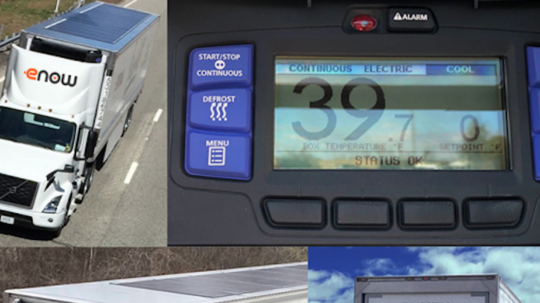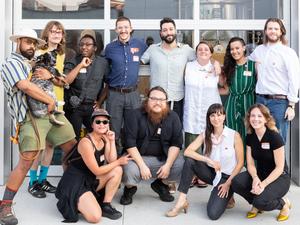
For every 24-hour shift, long-haul truckers are required by law to rest for 10 hours. During this time, their vehicles are often left idling in order to power their electrical appliances and keep the engine and fuel warm in the winter.
The roughly 27 million commercial vehicles in the U.S. end up consuming 6 billion gallons of fuel annually while idling, or about 8 percent of all fuel consumed annually in the U.S. alone.
Since 2011, the Warwick-based company eNow has been developing patented solar auxiliary power systems to reverse this trend, providing environmental benefits and much-needed cost savings for the trucking industry.
"We wanted to start here in Rhode Island and build a business that had the opportunity of making a difference by reducing fossil fuels in the transportation industry worldwide."
“There is strong demand of people reducing idling, and if you can do it with renewable energy it’s even better,” Jeffrey Flath, founder, president and CEO of eNow, told Rhode Island Inno. “We are reducing maintenance costs and providing other savings by application.”
The company installs solar panels on the roofs of commercial vehicles that produce energy fed into an onboard auxiliary battery pack. This energy, along with energy from the vehicle’s alternator or shore power when available, is used to power comfortability functions (such as when a driver is charging a cell phone) or operating functions (such as keeping the batteries on a truck’s liftgate charged).
Since launching about seven years ago, eNow has deployed 4,500 solar systems. The company goes to market by selling to equipment manufacturers or companies that sell to trucking fleets.
ENow has been expanding into other industries, most recently unveiling the first all-electric, solar-based refrigeration system aimed at the food industry. The new technology can transform a refrigerated straight truck or 53-foot trailer into a 100 percent solar-electric “reefer” system. Said system can charge the refrigeration system’s auxiliary batteries to maintain an optimal cold temperature throughout a typical 10- to 12-hour delivery run.
Using eNow systems can result in savings for a number of different vehicles.
According to eNow, trucks with liftgates, which have notoriously short batteries, can save $1,000 to $3,000 annually with the company's systems, and for every hour not idling, fuel burn is reduced by one gallon.
The Mesilla Valley Transportation fleet said on its website that the company saved $1,520 per truck in its four-year life cycle, primarily because battery replacement went from 200 percent to 10 percent when eNow systems were added.
ENow solutions can also be used to charge batteries on buses, which translates to increased revenue of $1,000 to $4,000 per year based on customer feedback and extensive testing eNow has conducted.
Last summer, eNow tested its solar-based refrigeration system on a commercial truck in San Joaquin Valley, California. During this test, it produced emission reductions of 86 percent carbon dioxide, and also reduced the truck’s operating costs by up to 90 percent.
“We think the commercial industry, primarily anything that has to be refrigerated, is where we feel we are best fitted for the market,” said Flath. “We wanted to start here in Rhode Island and build a business that had the opportunity of making a difference by reducing fossil fuels in the transportation industry worldwide.”








